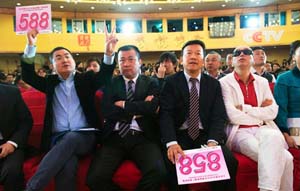

The central government will make up the shortfall in local governments' revenues by slashing specially earmarked funds and boosting rule-based transfers, instead of directly ceding fiscal powers, the vise finance minister said on Tuesday.
In a news briefing on the reform blueprint by the Third Plenum of the 18th Central Committee of the Communist Party of China, vice finance minister Wang Bao'an said the reform direction for China's public finance distribution system is to take back much responsibility for funds previously entrusted to local governments.
"Reducing formerly entrusted items is one direction," he said, "Without clarity of administrative authority, there is no basis upon which to discuss revenue division," Wang said.
This suggests Beijing will stabilize the current central-local revenue division paradigm while steering the transfer payment system toward a more rule-based one: filling the fiscal gap local governments faced through general transfer payments.
This is different from the previous reform advocated by some experts who believed local governments should have more fiscal power commensurate with their spending responsibilities.
This official direction is also evident in the recent policy statement calling for the establishment "of a system in which government's administrative authority and spending responsibilities were commensurate".
Previously there were calls to address the disparity between "administrative authority" and "fiscal power". "Why use the term 'spending responsibility' instead of 'fiscal power'? Because the former is only about 'money usage'," said Wang, saying local governments would not be able to have more independent fiscal revenue at their own discretion.
Under China's fiscal arrangement since 1994, the central government takes about 48 percent of the national tax revenue while the remainder goes to local government.
But central government shoulders only 15 percent of the spending responsibility while the local government shoulders 85 percent.
 Latest trend in tram
Latest trend in tram
 CCTV 2014 advertising auction kicks off in Beijing
CCTV 2014 advertising auction kicks off in Beijing
 Toyota TMEC opens hybrid tech R&D operations
Toyota TMEC opens hybrid tech R&D operations
 Toilet paper wedding dress to advocate low carbon lifestyle
Toilet paper wedding dress to advocate low carbon lifestyle
 Adrenalin-pumping competition on the course
Adrenalin-pumping competition on the course
 High-octane weekend of motorsport
High-octane weekend of motorsport
 3D light show displayed in Shanghai
3D light show displayed in Shanghai
 Lenovo moves up the ranks
Lenovo moves up the ranks